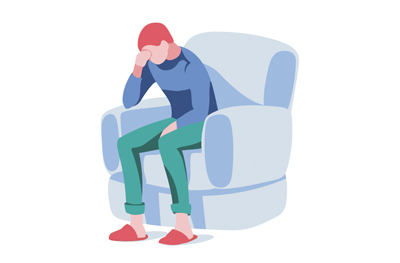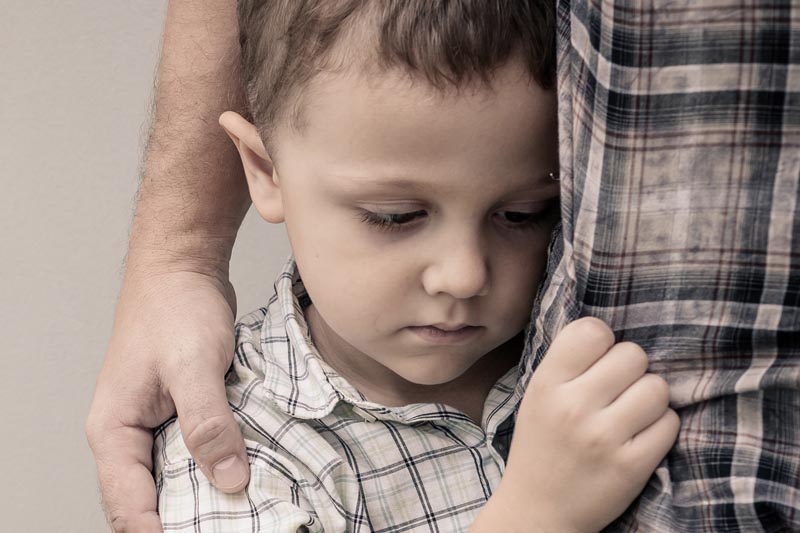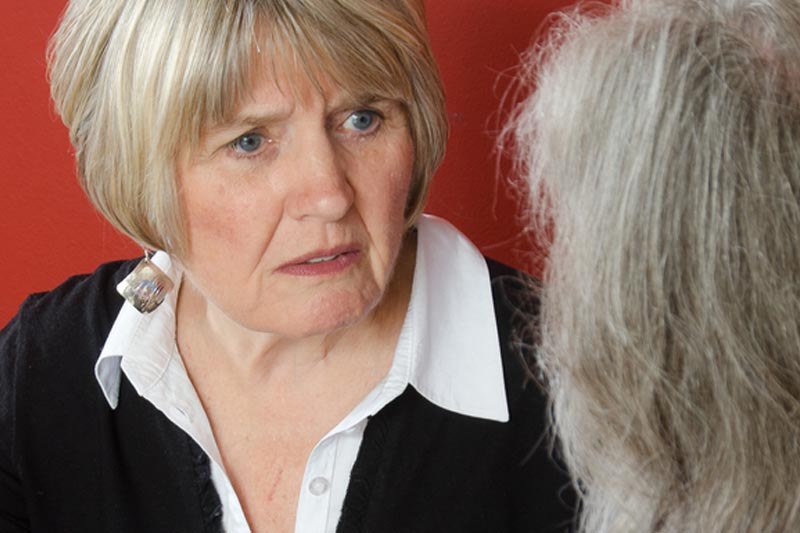Grief is the reaction we have to most significant losses in our lives. Some of the losses that commonly give rise to a grief reaction include:
- ending a relationship
- loss of career or employment
- death of a pet
- loss of a significant role or position of status
- loss of health
loss of cherished plans, a goal or dream.
One of the most disturbing losses that all of us will be likely to experience is bereavement: the death of a person who is significant to us. Since bereavement often gives rise to a major grief reaction, what we observe of bereavement grief can help us to make sense of the grief of most other losses. Bereavement grief will be the focus of this section.
Bereavement Grief
The grief of bereavement is a reaction, psychologically and physically, to the changes thrust upon us because of a person’s death. We are forced to find a different way of going about our lives, coping with the gaps, and a whole host of unforeseen changes and happenings.
How severely we experience grief, and for how long, depends on many factors such as: what the lost person meant to us – how significant the person was to our sense of well-being or security; how involved we were with the person; what role we played in caring for him/her (such as in the case of a long period of illness); how strongly we identified with the person’s experience or that of others around him/her. Our state of mind, health, emotional resilience, and what other things were happening in our lives at the time, are also factors.
Bereavement is not only a major loss in itself, but it often sets off a chain reaction of other losses (that may also have to be grieved and adapted to) such as:
- loss of income or financial security/stability
- loss of routine, stability, and order promoted by (amongst other things) the demands of having to adopt new roles (perhaps once those of the deceased) and take on new tasks and responsibilities
- loss of a future together, or one in which the deceased would have played a significant role
- loss of home or accommodation arrangements
- loss of mutual friends
loss of opportunities for social gatherings and interactions that were previously linked to the deceased person’s work or interests.
Although its initial intensity usually diminishes with time, grief may be felt for an extended period, even up to several years. Sometimes, the pain of grief intensifies during the first few months after the death, because not only are the reality and consequences of the loss ‘sinking in,’ but the support of others tends to fall away – often because people less affected have moved on or, if similarly affected, are preoccupied with their own pain and struggle.
Grief is a journey that demands a lot of patience, effort, energy, and a preparedness to experience much emotion. As well, it calls for the courage and daring to walk a new path, and to adapt to new challenges with hopefulness.
Normal Grief
Normal grief encompasses a whole range of emotional and mental experiences, characterised by:
Shock – Feelings of numbness, unreality, emotional detachment, being in a dreamlike state, which may last for minutes, hours, or weeks.
Pain of grief – A very painful emotional/psychological anguish, with often considerable physical discomfort, including: shaking, wrenching of the gut, uncontrollable crying, chest pain, and weakness. This ‘whole of person’ anguish is what we term grief. Grief can be powerfully intense at first, only subsiding with the passing of time – but often able to be reactivated by reminders of the deceased.
A sense of loss – This is often the trigger for grief: realising at an emotional level that the one who has been lost cannot be retrieved. This is the experience of losing not only the person who has died, but also all of the things associated with the relationship, such as companionship, shared activities and responsibilities, communication, affection, future plans.
Anger – A common emotion associated with being or feeling powerless, losing one’s sense of order, control; being unable to change or alter what has happened. Anger may be directed at others (because it often needs someone to blame) or at oneself.
Guilt – often mingled with regret and anger, may be felt for not being the person who died – for surviving; or because of some sense of responsibility for the death, for the degree of the deceased person’s suffering, for not having been honest, available, loyal, caring enough – or perhaps insistent about that person’s safety or health. (“Why didn’t I make her stop smoking?”)
Regrets – are common no matter how good a relationship was; regrets about things left undone or unsaid, or about missed opportunities – how things could have been.
Anxiety and fearfulness – are a response to life’s order, predictability, security, and one’s own sense of balance having been overturned. Being faced with such upheaval, and a keen sense of emotional vulnerability, can bring waves of acute anxiety and feelings of panic.
Intrusive images – These can occur particularly if the death happened in dramatic or traumatic circumstances, or where immense meaning was associated with the events of the death. Such images can be quite vivid and detailed, and may emerge most when one is alone, before going to sleep, or when one is mentally less active.
Mental disorganisation – In the early weeks of bereavement – and sometimes persisting for months – the experience of some mental disorganisation including poor concentration, confusion, forgetfulness, and being easily distracted, is common.
Feeling overwhelmed – The sometimes immense emotional and mental upheaval of loss and grief can be experienced as profoundly overwhelming – including for people who have always prided themselves on their ability to cope with adversity. Compromised in their usual capacity for thinking things through and maintaining emotional balance, they may nevertheless have to deal with a whole range of practical tasks and demands.
Relief – When a spouse, partner, relative, or friend has suffered a prolonged illness, or much pain, disfigurement, or personality change, it is quite normal to feel relief when they die – because of their suffering (and one’s own feeling of being powerless to change the inevitable), or perhaps because of being fatigued by the great demands of devoted caring.
Loneliness – It is common, even in the company of caring and supportive relatives and friends, to feel very alone in grief. After several months of bereavement, a person may feel loneliness most severely. Other people (perhaps less close to or involved with the deceased) have moved on; their lives appear to be back to normal. The blurring and preoccupying pain and turmoil of grief begins to permit the realisation of aloneness in a new and stark way: the loss of companionship, sharing of intimacy, experiences, daily tasks and responsibilities. Particularly for the elderly, loneliness can be a profoundly diminishing and depressing experience.
Positive feelings – Grief does not prevent positive feelings and experiences altogether. Quite contrary to any idea of showing disrespect for the deceased, they may be a celebration of, and compliment to, the quality of a former relationship. That one can sometimes emerge out of grief and see the goodness of life, the future it holds, and experience some ordinary day-to-day things with joy and pleasure, is a sign of ‘healthy’ grief.
Grief Avoidance
No one wants to experience the pain and upheaval of grief. Who wouldn’t want to avoid it? The problem is that it can only be avoided at our peril. It doesn’t go away if ignored – if anything, it becomes even more overwhelming for having been delayed.
IMPORTANT
People who are grieving will from time-to-time need to ‘take a break’ or be distracted from the pain and emotion of grief. They will also need to pay attention to the new tasks, challenges, role demands, and practicalities created by bereavement (which will tend to prompt, on occasions, a return to experiencing grief emotion). Part of healthy coping with grief is when a person moves between the pain and emotion of loss and the tasks, challenges, and practicalities of ‘restoration’: attending to life changes, doing new things, forming a new identity and new relationships.
It is when these patterns become rigid, fixed, or are used excessively that they become a problem, because they supplant a normal process of grieving.
Seeking to avoid grief altogether is never helpful. Bereaved people commonly use one or more of a variety of grief avoidance patterns in a bid to escape dealing with grief. Some of these patterns are a quite legitimate, temporary means of survival and coping. People who use these patterns are usually unconscious or only partly conscious of doing so.
Continually avoiding grief means avoiding feelings, the capacity to enjoy life, living and loving; this results in moving away from oneself and others.
To deny, continually suppress, block, or deaden a grief experience can have serious consequences for:
- mental health
- physical health
- relationships
- personal safety
- future life.




